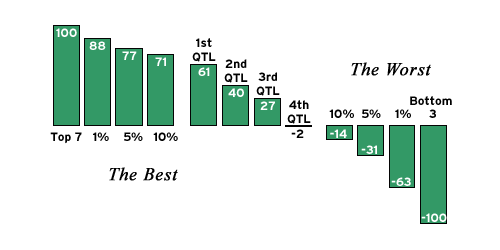Businesses seem to have trouble understanding the concept of value, and I'm not referring to recent voodoo accounting practices. I mean value as defined by value's final arbitrator, the customer. And like it or not -- regardless of quality -- if the customer won't pay, the product or service has no value.
But understanding value from the customer's viewpoint can be a complex task. Even the simplest products and services have a long list of potential features that influence a customer's perceptions of value.
Companies that try to see value from the customer's perspective can complicate the situation by asking the wrong questions. Businesses are often biased toward asking questions about things that seem to be controllable -- and the more easily controllable, the better. So when companies do market research, they tend to ask questions like: What color should the product be? How many rings did it take until someone answered your call? What price should we charge for this service? These questions seem to focus on aspects of products or services relevant to customers. But when it comes to driving customer engagement and creating corporate value, the answers to all of these questions are irrelevant.
Why? Because when companies evaluate a product's or service's features, questions about the most important factor in creating value -- people -- are typically omitted. This is unfortunate, because Gallup's research clearly shows that the employees a customer interacts with during a transaction are the dominant influence on a customer's perception of value and are key to the customer's future engagement with the company.
This has important implications for businesses. It means that a product or service passes through one final filter -- the sales or service employee -- before customers assess the value of the products or services they just purchased. A positive experience with a sales or service employee can heighten the customer's engagement with a company; a negative experience can destroy a relationship.
This isn't new. Companies know their sales and service forces are important as value builders. So why should most businesses worry? Because the same businesses that say they understand how important their employees are in creating value fail to manage those employees effectively. And the result is that a huge source of potential corporate value -- employees -- remains untapped. Let's look at some data that reinforce this point.
 |
The bars in the chart represent the customer loyalty created by customer service representatives (CSRs) during the calls they handle. These data are drawn from 45,000 customers who were interviewed after they interacted with one of approximately 4,500 CSRs -- about 10 customer surveys per CSR.
When The Gallup Organization measured CSRs on the loyalty they created with customers following a call, we found that the top seven customer service reps showed astounding performance levels -- they created loyal customers every time they spoke with a customer (see far left bar, "Top 7"). The far right of the chart, though, shows that the worst three CSRs created completely the opposite effect: They angered every customer they talked to.
What does this have to do with creating corporate value? This wide range of customer experience translates directly into a comparably large gap in financial outcomes produced by the best and the worst CSRs. CSRs who deliver poor service destroy corporate value by increasing costs: they make customers call back more often to get their problems solved, they drive customers away, and they miss opportunities to create incremental revenue for the company. CSRs with the best customer loyalty creation, on the other hand, create corporate value by keeping service costs low, decreasing customer attrition, and increasing revenue. In this case, the reward for moving the bottom quartile CSRs to just-average performance levels would be more than $300 million.
How can businesses claim to be managing corporate value effectively when their customer-facing employees range in performance from absolutely perfect to completely terrible? It's because these businesses frequently give lip service to the notion of providing an excellent customer experience, but they aren't really interested in managing to meet those goals. And yet these same companies claim that increasing corporate value is their number-one priority.
What is the solution? Companies must develop a management approach that recognizes the importance of relationships with customers and builds strategic systems to manage that relationship (and a customer relationship management system by itself is not the solution). Instead, managers must understand the role customer emotion plays in creating corporate value and the powerful effect frontline employees have in creating customer engagement.
Where should a company start in its effort to realize this source of value? A first step would be by using an old corporate standby, measurement -- but measurement of issues that matter. Companies must measure how customers react emotionally to employee performance, and they must measure it at a level that is useful -- CSR by CSR. Once companies understand the financial potential of a customer's emotional engagement and measure it, then they can begin to manage the key variable in creating value -- their employees.